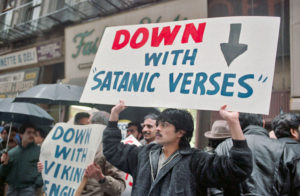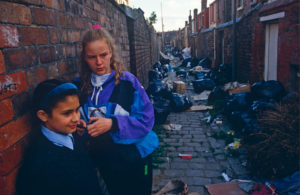The signs were there throughout his entire life that my father could not write. I can see them now but only with the benefit of hindsight and only when it is far too late. In fairness, he hid them well. He was an old-school stoic and there are many things a man, particularly of my father’s time, could conceal behind a beard, a host of tattoos, and silence. “Still waters run deep” my mother would say of him, or “It’s the quiet ones you have to watch” at other, more apprehensive, moments.
Some of the signs seem obvious now. A heartfelt but garbled message he’d chalked for my mother’s birthday before he left for work. How he would hover around, very slowly and subtly, trying to get us, his primary school-age children, to fill in forms he needed. In terms of boundless curiosity and the vastness of his references, from the intricacies of Brehon Law to the Latin names for plants to obscure battles of the Second World War, he was perhaps the smartest man I’ve ever met. And yet he carried the burden of illiteracy, silently, since he was a boy. Were I not his son in terms of unsentimental temperament, it would break my heart to think about.
In the end, there was no space to hide it any longer, no room left to evade or disguise. It was silence itself that revealed the condition. Unexpectedly and brutally stricken with Covid, my father ended up critically ill in ICU. Breathing via a ventilator and tracheostomy, it was impossible for him to talk. When the nurses approached him with pen and paper, and then an alphabet chart to point at in order to communicate, he waved them away. At first, they thought it was intransigence, but it soon became clear what the real issue was. Though an avid reader, he could not spell even the simplest of words.
For the next six months, they tried their best to understand him at his bedside, as did we; attempting, on glitching video calls, to read his lips. Due to the facial necrosis he suffered when they had laid him in the prone position to initially save his life, there wasn’t a great deal to read. In my weaker moments now, waking in the blue hours of night for instance, I feel haunted by the one word he mouthed that I could unmistakably make out — “home”, a place to which he never managed to return.
Since then, I have sought to understand the origin of my father’s illiteracy, which has led me deeper and deeper into the issue itself. Though I have worked in schools and witnessed, first-hand, children who struggled or were left behind, I hadn’t fully appreciated the immense scale of the issue. In global terms, according to UNICEF: “Nearly a billion people entered the 21st century unable to read a book or sign their names.” The OECD has found that one in six adults in England, over seven million people, “have very poor literacy skills”. Though studies differ in measuring terms, they do point to literacy difficulties being even more prevalent in Scotland (one in four people) and Northern Ireland (one in five). The Treasury’s Leitch Review of Skills in 2006 aired on the conservative estimate that “one seventh (five million) are not functionally literate”. In truth, the numbers vary and are frequently contested but all the studies suggest that millions of lives are profoundly impacted.
Why, then, is there such silence on the issue? One reason is the marginalisation of those who are affected; chief among whom are children, a group who can’t advocate for themselves, and, in particular, poor children. According to the Department of Education in 2019, 65% of children leave primary school having achieved the expected standard in reading, writing and mathematics, meaning that 35% will not.
Poverty plays a massive part in this, coupled with lack of resourcing, social exclusion, familial cycles of deprivation and so on. In 2019, End Child Poverty claimed there were 4.3 million children (30%) living in poverty in Britain. The correlation between poverty and illiteracy comes up again and again, both additionally linked to mortality. The National Literacy Trust’s findings in their Literacy and life expectancy study are staggering and scandalous: “A boy born in Stockton Town Centre (which has some of the most serious literacy challenges in the country) has a life expectancy 26.1 years shorter than a boy born in North Oxford (which has some of the fewest literacy challenges).” The issue casts a shadow over entire, foreshortened lifespans.
Economics go a long way in terms of explanation, but aren’t the only factor. Instead, we face a complex tapestry of failings and unmet needs that suggest negligence at best and, at worst, the wilful discarding of swathes of the population in terms of class, geography, demographics and so on. End Child Poverty has pointed out that “46% of children from black and minority ethnic families are growing up in poverty, compared with 26% of children in white British families”. Meanwhile, a 2018 government study of Year One pupils in England who have met the expected standards in phonics, one of the building blocks of literacy, found attainment by children from Roma and Irish Traveller backgrounds to be around half that of every other demographic (roughly 40% compared to 80%+). Between the groups are disadvantaged/working-class white boys, with 62% meeting the standard. Many groups are being let down in different though related ways. A society can be judged by how it treats its young. Children do not fail but rather are failed.
There are always outcomes to consider. In 2009, KPMG declared that: “Low levels of literacy undermine the UK’s economic competitiveness, costing the taxpayer [up to] £2.5 billion every year.” In some ways, the possibilities are even worse than they were in my father’s day. At least he had the refuge of almost-entirely manual labour to move into. Most jobs now require a degree of literacy, with the digital revolution spreading into every aspect of life. The DCMS No Longer Optional report claimed digital skills were essential for two thirds of occupations, including 77% of so-called “low-skill jobs”. The WEF indicate the issue will only get worse, with many at risk of being left behind: “In the future, nine out of ten jobs will require digital skills, yet today 44% of Europeans aged 16-74 lack even basic digital abilities.” Employers are already feeling the deficit. In 2013, the CBI’s Changing the pace study found 32% of employers were dissatisfied with the literacy levels of young people, while a BIS report in 2016 found that “one in eight (12%) workplaces in England report a literacy and/or numeracy gap whereby at least one member of staff is unable to perform certain literacy… tasks to the level required in their day-to-day job”. While enlightening, statistics and particularly the managerial approach to society may be part of the problem, however. We need, instead, to look at the cost from a human level.
The issue is exponential and cyclical, something akin to a phenomenon called “the Drowning Machine”, which requires some explanation. My father worked for the council and though his role as a gardener-groundsman was a largely peaceful horticultural one, it involved the use of heavy machinery; equipment that could, if one were not careful, result in the loss of an eye or a finger, the permanent damaging of one’s back, and so on. One of the methods employed by managers, to underline the need for health, safety and endless vigilance, was to show the crew footage that would sear into their minds. My father would come home, take off his Hi Vis vest and boots, shake his head and say to my mother: “Christ, you wouldn’t believe what we watched in work today.” Then, thinking he was out of earshot of his kids, he would relate the real-life video horrors they’d witnessed of the Bradford City stadium fire, footage of some poor factory worker being sucked into a machine or sinking into a silo. I was a curious child, of a slightly morbid disposition, so my ears pricked up at each pitiful and graphic description.
One account became rich material for my nightmares for years to come. My father had to cut grass and tend plants on all manner of landscapes from hills to ditches to the edges of waterways. Given that his parents had both drowned in the local river, I imagine he would have been somewhat cautious — but to drive home the point, he and his colleagues were shown a video on the dangers of canals, rivers, reservoirs and other waterways. One of the most perilous were low head dams, which look fairly innocuous; a slowly drifting river that pours over a small weir with apparently minimal turbulence. Yet in certain cases, a “submerged jump” forms near the base of the dam, creating a loop of circulating water pushing downwards, back towards the dam, upwards and downwards again, in a spinning cycle. If a swimmer or kayaker is unlucky enough to be pulled down into a particularly strong version of this — and the force of water can be immense — they can find themselves stuck in a loop or maelstrom known as a “keeper”. Warning signs of this phenomena show a pirouetting figure under the water, trapped in “the drowning machine”, unable to extricate themselves and endangering the lives of would-be rescuers, who make up around a quarter of its victims.
During my father’s six months of silence, my mind kept returning to the image of the stricken figure spinning over and over in the water, and no matter how strong they were and how bravely they fought, each time they tried to surface, another wave would hit them and successive cycles would weaken them until there was nothing left. It reminded me of the cycles of poverty I’d witnessed to which I’d lost loved ones. When someone’s life begins to fail in already difficult circumstances, there’s a tendency for problems to multiply. Disaster is effectively intersectional: spiralling finances, deteriorating psychological and physical health, social alienation, dependencies, legal issues and so on. Self-extrication is rare.
Those who leave school functionally illiterate have often been trapped in the drowning machine since childhood. Life goes wrong early — whether its poverty, abuse, neglect — and if intervention is not early, it is much harder to extricate. The “Every Child A Reader” programme notes that “70% of pupils permanently excluded from school have difficulties in basic literacy skills”. This flows, demonstrably though not inevitably, into adulthood with the Social Exclusion Unit reporting: “80% of prisoners have writing skills at or below the level expected of an 11-year-old child; the equivalent figure for reading is 50%.” The Ministry of Justice found in 2021 that 57% of prisoners had literacy levels below those expected of an 11-year-old, with the Skills Funding Agency reporting in 2018, over a third of prisoners reported that they have “a learning disability or difficulty”. This hampers the abilities of prisoners to keep in contact with the outside world and reintegrate into it, especially through employment, with the Shannon Trust emphasising the importance of literacy in terms of reducing recidivism.
Many problems emerge from illiteracy. Some pose as solutions. If education or family cannot or will not offer a lifeline, others will step up, preying on frustration, lack of legitimate options for betterment and low self-esteem. It provides a hunting ground for exploitation by older predatory “rescuers”, in the form of gang leaders, sex traffickers, drug dealers and extremist groups. These routes seem a way out of the drowning machine but are merely a deepening of the cycle. Chances of real escape decline once you have a criminal record, are identified on the Gang Matrix or by MI5, or end up with a drug addiction.
Here we find another troubling element to the silence surrounding illiteracy. Many of the most shameful scandals in recent decades have been to do with the abandonment and betrayal of children — paedophilia in the Catholic Church, Savile and the BBC, rape gangs in numerous English towns preying on young working-class girls, the death toll of young people through knife crime, and the epidemic of childhood poverty. All of these have faced a wall of silence, effectively disappearing the victims, for a number of reasons — deference towards powerful institutions, ideological inconvenience, callous indifference masquerading elsewhere as compassion. One overlooked factor is the gentrification of journalism away from the local and investigative, increasingly into cloistered upper-middle-class lifestyle commentaries, hot takes on passing fads and clickbait distractions. Without addressing this silence and the noise that disguises it, little will change.
All my life, I had thought that my father had escaped the drowning machine. I believed he had extricated himself from a youth of deprivation, violence, and prison. He had done so by choosing his family, his trade, his camaraderie with his workmates, his music, his bodybuilding, his love of nature, his stoicism. He was a proud man, who showed me how to live and how to die with bravery and nobility. He would never have claimed to have been a victim.
Yet I saw in those last months that he hadn’t escaped the drowning machine. As a little boy with undiagnosed dyslexia (a condition 10% of the population share), my father had been failed and, though he did the best he could to get out, it caught up with him at the end. He never made it out entirely. There are children right now in this country who are forced to carry and hide the same burden. The shame they feel has been given to them. It belongs to us.
Disclaimer
Some of the posts we share are controversial and we do not necessarily agree with them in the whole extend. Sometimes we agree with the content or part of it but we do not agree with the narration or language. Nevertheless we find them somehow interesting, valuable and/or informative or we share them, because we strongly believe in freedom of speech, free press and journalism. We strongly encourage you to have a critical approach to all the content, do your own research and analysis to build your own opinion.
We would be glad to have your feedback.
Source: UnHerd Read the original article here: https://unherd.com/




